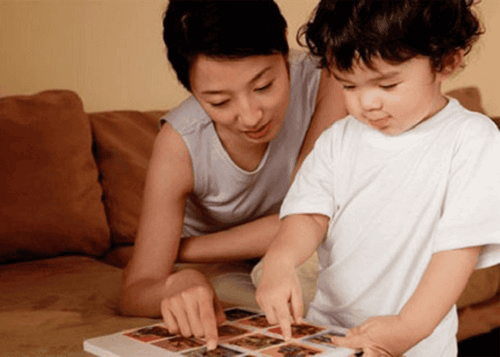This is an automatically translated article.
Posted by Doctor Pediatric Center - Vinmec Times City International Hospital
The rate of language development is different for each child. However, the following signs will help parents know when to take their child to the doctor.
1. Language development in stages
Children develop at their own pace. While many babies start babbling mama and baba on their first birthday, most babies can say about 8-10 words by the time they're 18 months old. However, if your child has a significant delay in speech, it should be a concern.
0 to 3 months old: Screams and laughter are the earliest language skills. It's worth building a bond with your baby - laughing, playing, talking and singing with him, and making sure he can follow and respond to sounds. 7 to 12 months: Babies begin to use words like mama, baba, and dada. Children may not use them meaningfully, but they are important first words. Look for gestures like pointing, clapping and waving, which are all early signs of communication skills. 12 to 18 months: Check if your child's vocabulary increases from about 2 to 3 words up to 25 to 50 words. Also, notice if your child can follow simple one-step commands. 18 months to 2 years: At this stage, the vocabulary should increase to 50 words or more and the child should be able to combine 2 or 3 words to form a sentence. After 2 years of age, if the child cannot speak compound words or speak more than 15 words, parents need to take the child to be examined at a medical facility to intervene in the child's speech practice.

2. Factors affecting speech
If, as a parent, you suspect your child has a speech delay, you should consult a paediatrician. But there are certain points about speech delay that you need to pay attention to first.
Speech and language delays are part of a comprehensive developmental delay that affects all other skills such as motor and cognitive skills. Hearing loss of varying degrees affects speech and language. Lack of environmental stimulation and inadequate social interaction and no peer group play can affect speech. Speech and language delays may be associated with mental development conditions such as ASD (Autism Spectrum Disorder) and ADHD (Attention Deficit Hyperactivity Disorder). Why do delays in speech and language cause so much concern for parents and doctors? That's because language development is central to many aspects of a child's holistic development such as cognition, social interaction, and education.

3. What should parents do when the child is slow to speak?
If you are worried about your child's speech delay, take your child to be checked at a medical facility that specializes in pediatric psychiatry because early intervention is always better. Doctors can evaluate the child and, if needed, develop goals and provide a program for monitoring the child at home.
It should be noted that parents and caregivers play a major role in stimulating language skills in children.
4. Tips to encourage communication from birth to two years old:
Respond to baby sounds and smiles and smile back. Talk to your baby as you bathe, feed and dress him. Talk about what you're doing and where you're going. Use gestures like waving or pointing at objects and people around you. Talk about animal sounds. Play with your child. Help children complete incomplete sentences. Read fun picture books for kids. Repeat what you say. Repetition is the key to learning new words. Children don't get tired of hearing these words over and over again. In fact, it helps children develop language

While talking to a child, it is necessary to:
Observe: What the child wants to communicate
Waiting: Give appropriate time for the child to respond
Listening: When we listen and pay attention, we can understand the needs of the child and the child also confidently communicates.
So choose your goal, engage with your child, talk to him and keep repeating the words. Leverage the power of play and music and don't forget to use Observe - Wait - Listen. Language delay in children is a common form of developmental delay. The age at which children learn to speak and learn can vary. However, if your child has not yet started speaking by a certain age, it is always a good idea to consult a specialist.
In addition, parents also need to supplement their children with essential micro-minerals such as zinc, lysine, chromium, selenium, vitamin B1, ... to fully meet the nutritional needs of children. The addition of these essential vitamins also supports digestion, enhances nutrient absorption, improves anorexia, and helps children eat well. Parents can simultaneously apply dietary supplements and functional foods derived from nature for easy absorption. The most important thing is that improving your baby's symptoms often takes a long time. Combining many types of functional foods at the same time or changing many types in a short time can make the baby's digestive system unable to adapt and completely not good. Therefore, parents must be really patient with their children and regularly visit the website vimec.com to update useful baby care information.













